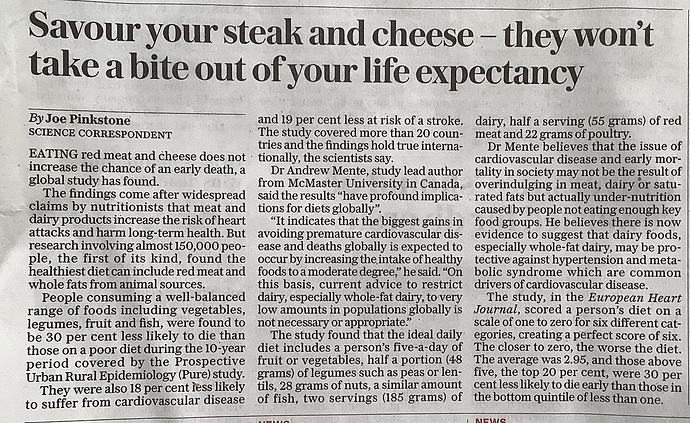Today’s UK Telegraph
Who’d have Thought -10 year Canadian Study
I am a healthy 75 year old that has always eaten red meat and drank whole milk. My most unhealthy time has always been when I ate a high carb diet. My healthiest seems to be now eating a moderately low carb diet and fasting an average of 19 hours per day
Given the self-reporting of dietary habits (prone to exaggeration and self-delusion) and the epidemiological basis of the study (inherently fraught with confounding variables for which there exist no controls), I’m tempted to put this article in the Show Me The Garbage bin.
I appreciate seeing that eating a “healthy” diet that includes red meat and full fat dairy is not being vilified. But the rest of the so-called conclusions are a reflection of the presumed eating habits of the overall population, not an actual cause<>effect scientific conclusion.
Call me unimpressed. 
I am encouraged that red meat and fat from animals isn’t getting vilified, though.
Same here. No detail here but it wasn’t negative and it was front page!
Yes, and this message needs to be pushed way more, because the anti-meat agenda is VERY loud.
For any of us tempted to conclude that our eating habits are promoting longevity (a group in which I include myself), consider that those with the same eating habits who are now dead are not here to offer a counter narrative.
Fun with epidemiology!
… and food for thought 
Here’s an MSN link (with graphics/stats etc.):
Eating red meat and cheese doesn't lead to an early death, study finds (msn.com)
We all die at some point in time. My great grandfather lived to be 106. He didn’t believe in motorized vehicles, and he lived strictly off of the land. I spend my summers growing up with him in his cabin deep in the backwoods of East Texas. He told me how to hunt, fish, and how to grow just about everything needed to survive. I slipped away from that training during my working years but I am returning to his way of living more and more, and feeling so much better, healthier and happier in the process.
That’s an especially remarkable age to reach given how many years ago that was (i.e., your great grandfather)! Sounds like you’ve likely inherited his genes 
A little typo fun: Since your great grandpa loved strictly off the land, do you have any sense for how your great grandmother may have felt about this? 
At the risk of sounding cheeky…perhaps they both loved off the land.
I’ve done it many times myself lol 
Always keep an eye out for the Sasquatch though 
I’m sure the actual study was a bit more specific, but just have to vent my pet peeve, articles that use phrases like “a poor diet” and “a healthy diet” in a definitive sense, dismissing the fact that what constitutes poor or healthy is the whole issue here. 10% clarified terms, 90% assumptions.
It leaves such ridiculous wiggle room. When they say healthy, does that mean a glass of fruit juice and a bowl of Cheerios for breakfast? I mean yes, compared to Twinkies and Doritos for every meal with a side of whiskey & Coke, it’s “healthy”, but I personally would describe it as a 3 out of 10, pretty poor indeed.
Ah, the study in question is the PURE study. Good. They may not have done a perfect job, but they got things generally right, and they are coming up with surprising, but hard-to-assail conclusions about nutrition.
I’ve seen lectures by Dr. Andrew Mente, one of the principal investigators, talking about their early conclusions regarding salt intake. The director of the study is Dr. Salim Yusuf, a professor of medicine at McMaster University.
Good news … no early death!
But wait… Perhaps the next Q&A survey of 150,000 deceased subjects will reveal instead that red meat and cheese led to a slow and agonizing death?
More fun with epidemiology 
The big finding was the saturated fat contradiction to what we’ve been propagandised (is that a real word?) against. i.e in this chang of policy; early death for those who don’t partake in saturated fats? Or those that do, longer life than normal.
Skittish at best.
Dr Mente believes that the issue of cardiovascular disease and early mortality in society may not be due to overindulgence of meat, dairy or saturated fats but actually under-nutrition caused by people not eating enough key food groups.
He believes there is now evidence to suggest that dairy foods, especially whole-fat dairy, may be protective against hypertension and metabolic syndrome which are common drivers of cardiovascular disease.
The study, published in the European Heart Journal, scored a person’s diet on a scale of one to zero for six different categories, creating a perfect score of six, and the closer to zero a person was, the worse their diet ranked.
The average mark was 2.95, and the people above five, the top 20 per cent, were 30 per cent less likely to suffer an early death than those in the bottom quintile of less than one.
Data show that the people with the worst diets in the study, scoring less than one point overall, actually had the lowest level of saturated fat intake. Avoiding saturated fats is a central tenet of many modern diets yet those with the smallest amount in their daily food were the least healthy, the study found.
“[This] strongly suggests that current targeted dietary guidance limiting the consumption of saturated fat and dairy in many populations of the world may not be warranted,” Dr Mente said.


